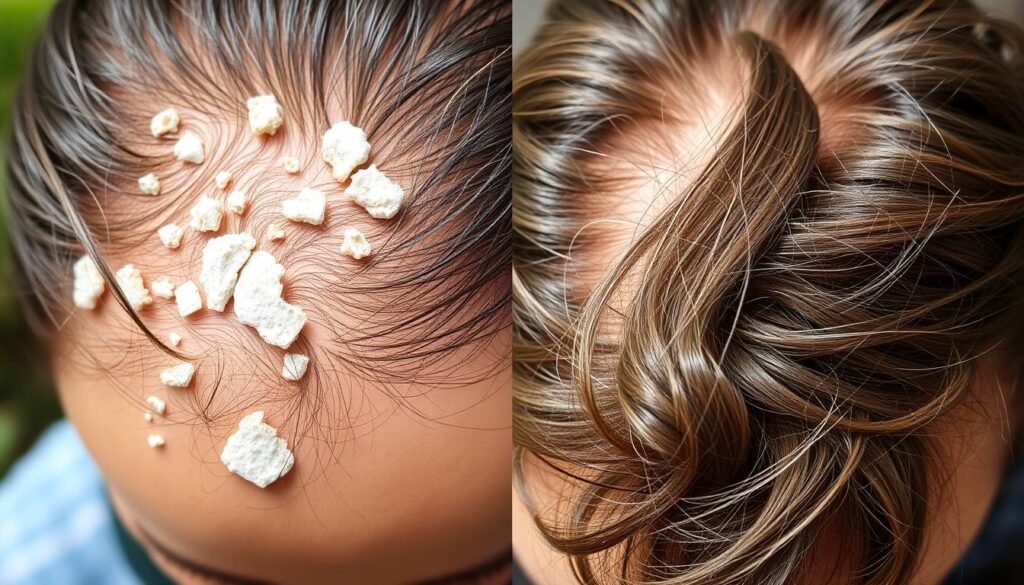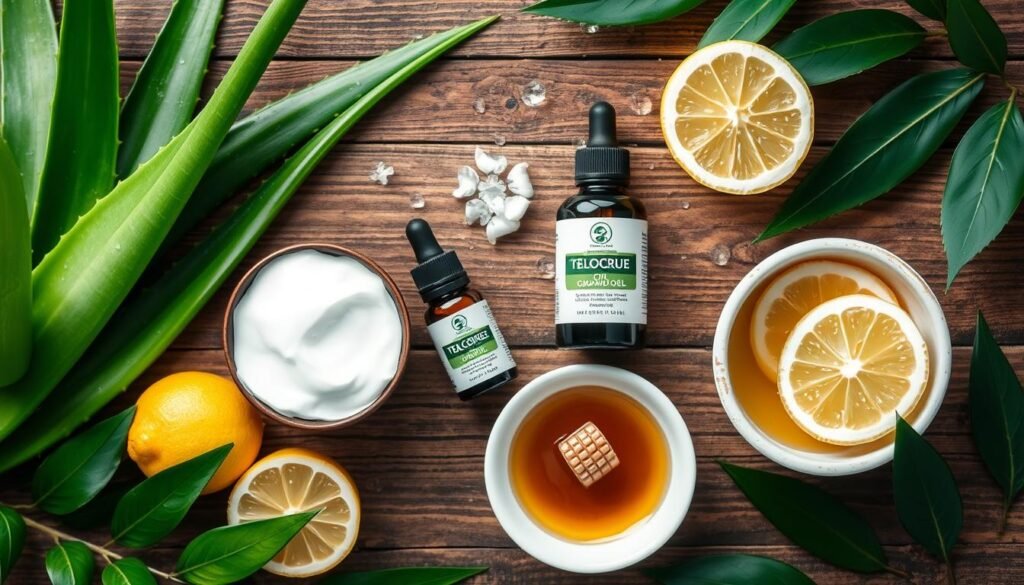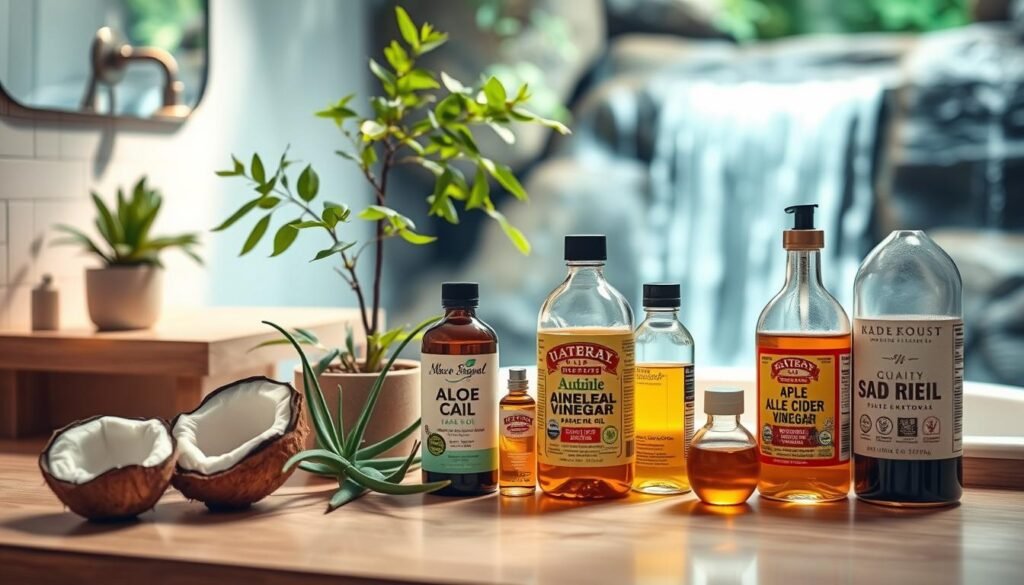Half of adults worldwide face dandruff at some point. This condition affects many, hurting their confidence and how they connect with others. Fortunately, there are natural remedies for dandruff that can heal your scalp. This means feeling good about how you look again.
Many things can trigger dandruff, like stress, dry air, and family history of scalp problems. It’s key to know what causes it if you want to get rid of it for good. Ingredients like tea tree oil, coconut oil, and aloe vera are great for your scalp. We will cover how these can treat and prevent dandruff.
Exploring different dandruff treatment options gives a better understanding of how to tackle it. This way, you can find lasting solutions.
Key Takeaways
- About half of all adults experience dandruff.
- Common causes include seborrheic dermatitis, eczema, and scalp irritation.
- Coconut oil and tea tree oil can effectively support scalp health.
- Stress management plays a crucial role in controlling dandruff.
- Consulting a dermatologist is advisable for severe dandruff cases.
- Regular hair and scalp hygiene is vital for preventing flare-ups.
- A balanced diet rich in omega-3 fatty acids promotes healthy skin.
Understanding Dandruff and Its Causes
Dandruff is a common issue, showing up as flaky skin on the scalp. It affects half of the adult population around the world. It can start in young adulthood and sometimes continues into older age. Dandruff isn’t just about having dry skin; many other factors play a role in causing it.
What is Dandruff?
White or yellow flakes from the scalp are signs of dandruff. It can make your scalp itch, irritate your skin, and turn parts of your scalp red. These issues can make people feel embarrassed and uncomfortable. That’s why it’s so important to know what causes dandruff.
Common Causes of Dandruff
Many things can lead to dandruff. They fall into different groups:
- Dry skin: Flakes can come from dry skin, especially when it’s cold and dry outside.
- Seborrheic dermatitis: This long-term problem makes oily areas flaky, leading to dandruff.
- Malassezia: A fungus that lives on the scalp. If it grows too much, it can cause dandruff.
- Sensitivity to products: Some hair products can irritate your scalp and cause flakes.
- Oily hair: People with oily hair might get dandruff more often.
How Dandruff Relates to Scalp Health
The condition of your scalp is key to whether you get dandruff. Stress and environmental factors like dust and the sun can make it worse. Let’s explore how scalp health affects dandruff:
- Washing your hair too often can remove its natural oils, leading to a flaky and itchy scalp.
- A good skin care routine can help you manage dandruff well.
- An itchy scalp can make you scratch, which might increase redness and irritation.
- Poor hygiene can build up oil on your scalp, causing more flakes.
- Massages for the scalp can help with blood flow, which might improve your skin’s health.
| Factor | Impact on Dandruff |
|---|---|
| Dry Skin | Can lead to excessive flaking and itchiness. |
| Seborrheic Dermatitis | Chronic condition that causes redness and severe dandruff. |
| Malassezia Growth | Overgrowth can lead to increased shedding and irritation. |
| Product Sensitivity | May trigger allergic reactions causing flaky skin. |
| Stress | Can exacerbate symptoms and lead to flare-ups. |
Identifying Different Types of Dandruff
Knowing the types of dandruff helps in choosing the right treatment. It’s important to tell dry scalp from oily scalp. Each kind has its own symptoms and needs different care.
Dry Scalp vs. Oily Scalp
A dry scalp shows up as small, white flakes on your hair or shoulders. This happens when your scalp lacks moisture. It’s often due to aging, certain hair products, or dry air. On the other hand, an oily scalp looks greasy, with bigger yellow flakes. It’s caused by too much sebum, which can also lead to dandruff. Men are more prone to both types because of their oilier skin.
Flaky Scalp and Its Symptoms
The symptoms of dandruff change with the type of scalp you have. You might feel more itchiness and see more flakes. Knowing this helps in finding the right treatment. For dry scalp, moisturizing shampoos help. Oily scalps may need special shampoos to cut down on oil and yeast.

How to Remove Dandruff Permanently: Effective Natural Solutions
Dandruff can make you feel uncomfortable and self-aware. Luckily, there are effective natural remedies out there. Using these remedies regularly can improve your scalp’s health and lessen dandruff.
Tea Tree Oil: Antimicrobial Benefits
Tea tree oil fights the fungi that cause dandruff with its antimicrobial power. Using it regularly can make your scalp healthier and reduce dandruff.
Coconut Oil: Moisturizing Properties
Coconut oil is great for moisturizing your scalp. It goes deep into hair, eases inflammation, and ups hydration. If you have dry skin, coconut oil can really help soothe your scalp.
Apple Cider Vinegar: Balancing Scalp pH
Apple cider vinegar can balance your scalp’s pH. This may help shed dead skin and lessen dandruff. Using it as a rinse after shampooing can show good results.
Aloe Vera: Soothing and Healing Effects
Aloe vera is amazing for calming and healing your scalp. It can reduce irritation and fight dandruff. Its antibacterial quality is also great for scalp health.

| Natural Remedy | Main Benefit | Application Method |
|---|---|---|
| Tea Tree Oil | Antimicrobial | Mix a few drops with a carrier oil and massage into the scalp |
| Coconut Oil | Moisturizing | Warm and apply to the scalp, leave for 30 minutes before washing out |
| Apple Cider Vinegar | pH Balancing | Mix with water as a rinse after shampooing |
| Aloe Vera | Soothing | Apply straight from the plant to the scalp and leave for 20 minutes |
These natural remedies offer a comprehensive way to tackle dandruff. Adding things like tea tree oil, coconut oil, apple cider vinegar, and aloe vera into your hair care can boost scalp health and cut down on flakes.
Implementing Hair Care Tips for Dandruff Control
Dandruff affects nearly half of people worldwide sometime in their life. The right hair care tips and products help fight it. By paying attention to scalp health, you can lessen dandruff.
Choosing the Right Hair Care Products
Choosing the right products is key to fighting dandruff. Look for shampoos without sulfates and gentle conditioners for flaky scalps. Ingredients like Zinc Pyrithione and tea tree oil fight fungus. Head & Shoulders 2-in-1 is a good anti-dandruff choice.
Establishing a Sustainable Hair Care Routine
A regular routine keeps your scalp healthy. Washing away oils helps stop flakes. How often you wash depends on your hair type:
| Hair Type | Recommended Washing Frequency |
|---|---|
| Greasy Hair | Every other day |
| Weak or Fragile Hair | Twice a week |
| Normal Scalp | Three times a week |
Try detangling your hair with your fingers in the shower to prevent hair loss. A cold rinse after showering locks in moisture. This makes your scalp feel better.
Importance of Regular Scalp Exfoliation
Exfoliating your scalp regularly removes dead skin and lessens flakes. Natural items like baking soda stop fungus growth. Oils, such as neem and essential ones, are great for pre-wash treatment. This enhances scalp health and dandruff control.

How Diet Influences Scalp Health
The link between what you eat and the health of your scalp is strong. Eating right can make your skin better and lessen dandruff. Knowing what foods to eat and avoid is key.
Foods to Include for Healthy Skin
Eating certain foods can boost scalp health and fight off dandruff. Here’s what’s good for you:
- Fatty fish: Salmon and mackerel have omega-3s that fight inflammation.
- Nuts and seeds: Walnuts and flaxseeds keep your skin moist.
- Probiotic-rich foods: Yogurt and sauerkraut boost your gut health and immune system.
- Leafy greens: Spinach and other greens are packed with vitamins for skin health.
- Whole grains: Brown rice and oatmeal provide fiber and nutrients for good digestion.
Foods to Avoid to Reduce Dandruff Triggers
Some foods can hurt your hair and skin, triggering dandruff. Try to eat less of these:
- Refined carbohydrates: White bread and sweet snacks can inflame your skin and make more oil.
- Processed foods: These lack nutrients and are not good for your scalp.
- Dairy products: For some, dairy makes the skin produce more oil, leading to issues.
- Alcohol: Drinking too much can dry out your scalp, making dandruff worse.
- Yeast-containing foods: Foods like beer and some breads can make dandruff problems bigger.
| Type of Food | Benefits | Foods to Avoid | Negative Effects |
|---|---|---|---|
| Fatty Fish | Rich in omega-3s, anti-inflammatory | Refined Carbohydrates | Can provoke inflammation |
| Probiotic Foods | Enhances gut health | Processed Foods | Lacks essential nutrients |
| Leafy Greens | Provides essential vitamins | Dairy Products | May increase oil production |
| Nuts and Seeds | Supports skin hydration | Alcohol | Worsens dryness |
| Whole Grains | Aids digestion | Yeast-containing Foods | Encourages fungal growth |
Eating a balanced diet helps keep your scalp healthy and may reduce dandruff. People react differently to foods, so it’s best to watch what you eat closely for the best effect.
Managing Stress for Better Scalp Health
Stress affects our health in many ways, including our scalp. It doesn’t cause dandruff by itself, but it makes symptoms worse. People with dandruff say stress makes their scalp more irritated and flaky. Knowing this helps us find ways to reduce stress and improve scalp health.
Link Between Stress and Dandruff
About 28% of people with seborrheic dermatitis say stress triggers their symptoms. Chronic stress messes with our immune system. This makes it tougher to fight off the fungal infections that cause dandruff. Staying emotionally healthy helps our mindset and our scalp.
Stress Reduction Techniques
Using stress-reducing methods is vital for our emotional and scalp health. Here are some good strategies:
- Yoga: It helps with relaxation, flexibility, and mental clarity.
- Meditation: Mindfulness can dramatically lower stress.
- Regular physical activity: Working out boosts mood and cuts stress by releasing endorphins.
Eating a balanced diet with lots of omega-3s also manages stress. Making these positive lifestyle changes can better scalp health and lessen dandruff. For more on handling dandruff well, check this comprehensive resource.
Using Anti-Dandruff Shampoos Effectively
Understanding how to use anti-dandruff shampoo right is key. You must pick the best product with the right ingredients. Look for these active ingredients:
Ingredients to Look For in Shampoos
- Pyrithione zinc: Fights dandruff and soothes scalp irritation.
- Selenium sulfide: Slows down skin cell production, reducing flakes.
- Salicylic acid: Helps remove dead skin from the scalp.
- Ketoconazole: A strong anti-fungal that tackles dandruff.
- Piroctone olamine: Offers more anti-fungal benefits.
Also, pick a shampoo that fits your hair type well. Products like the Head & Shoulders microbiome protect shampoo cater to different hair and scalp needs. They help maintain a healthy scalp microbiome.
How to Use Dandruff Shampoos Properly
To use correctly:
- Start with wet hair, then add the shampoo.
- Gently massage it in. Leave it for 5 minutes to work its magic.
- Rinse well, ensuring no shampoo is left behind.
- Last, use a good conditioner to keep hair moist.
Using such shampoos regularly is a must for fighting dandruff. Professionals recommend using them at every shower. For dry hair, shampoo less often, but don’t skip the moisturizing conditioner. If a shampoo stops working for you, try switching to a different brand.
When to Consult a Healthcare Professional
Knowing when to get help for dandruff is key. Not everyone can fix it with store-bought items. Sometimes, you need a doctor’s help. This is important for better scalp health.
Recognizing Severe Dandruff Symptoms
If you have bad dandruff, look out for these signs:
- Persistent itching that doesn’t stop with common treatments.
- Excessive flaking even after using dandruff shampoos regularly.
- Scalp redness or irritation that bothers you daily.
- Noticeable significant hair loss because of dandruff.
- Self-esteem impact from visible flakes or scalp issues.
Potential Treatments for Stubborn Cases
For tough dandruff, doctors might suggest different treatments:
- Special shampoos with zinc pyrithione, salicylic acid, ketoconazole, or selenium sulfide.
- Prescription-strength shampoos or scalp lotions for tougher cases.
- For a lot of inflammation, corticosteroid lotions may help.
- Antifungal medications, like fluconazole or terbinafine, for ongoing dandruff.
Store-bought treatments might work in weeks. Prescriptions take longer. A doctor can offer the best plan for serious dandruff.
| Treatment Type | Common Ingredients | Usage Recommendation |
|---|---|---|
| Over-the-Counter Shampoos | Zinc pyrithione, salicylic acid | Use daily until better, then 2-3 times a week |
| Prescription Shampoos | Ketoconazole, selenium sulfide | Use as the skin doctor says |
| Corticosteroid Lotions | Corticosteroids | Use when you have inflammation |
| Antifungal Medications | Fluconazole, terbinafine | Follow what the prescription says |
Conclusion
Dealing with dandruff means you have to understand why it happens and use natural ways to fix it. Finding the issue early, like when your head starts to itch or flake, is key. To keep your scalp healthy, take care of your hair, eat right, and manage stress well.
Using natural remedies, such as tea tree and coconut oils, can really help against dandruff. Check your diet to make sure you’re getting enough zinc and B vitamins. These nutrients are important for a healthy scalp. Always be active in looking after your hair and know when to get help for tough cases.
Keeping your scalp healthy is an ongoing effort. If you’re looking for more tips on dandruff, you can find them here. With the correct methods, you can get rid of dandruff for good.